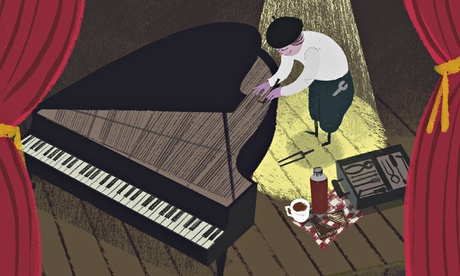
uestion: what does Radiohead's chief guitar technician, Peter "Plank" Clements, have in common with an anaesthetist? This isn't a snotty joke about the sedative effects of melancholic rock music. Both appear in David Zweig's recent book Invisibles, as examples of jobs that are unseen when they're done perfectly: you know something's gone badly wrong with a Radiohead concert or with an operation if either of these crucial people draws attention to themselves. Zweig's subtitle is The Power Of Anonymous Work In An Age Of Relentless Self-Promotion, and he travels widely to meet people who reject the modern ethos of personal branding and social media microcelebrity – what he calls "this cacophony of self-importance, of personalised electronic vuvuzelas". They include a concert piano tuner; a magazine fact-checker (as Zweig once was); the structural engineer responsible for some of the world's tallest buildings; a UN interpreter; and a "wayfinding" expert whose job is to combine signs, lighting and even carpet colour to guide people through airports. Newspapers similarly depend on such uncredited professionals. I'd be lost without them – though, for all you know, one of them inserted this sentence.
In Zweig's telling, invisibles aren't necessarily introverts. Nor does their dislike of the limelight mean they're deprived of financial or professional success, or confined to old-fashioned industries. What they all share, instead, is "a reverse skill set, hell, a reverse attitude about life, in a culture that seeks endless pats on the back". Many have plenty of pride, but it's pride in the work itself. It's the public renown that either leaves them unmoved or makes them feel queasy. And if Zweig's correct, they're also more fulfilled. It's been widely reported that too much focus on "extrinsic" motivators such as money or recognition can sometimes damage creativity and productivity. Invisibles are the ultimate intrinsically motivated workers, and may be "more prosperous, healthier and grounded" as a result.
Even if you wouldn't choose this kind of extreme invisibility, or your work doesn't allow it, it's a useful reminder that personal branding should always have secondary status: there's the work, which matters most; then there's promoting the work. Too often, among people highly proficient in self-marketing, you get the sense that the situation has flipped: promotion has become their main thing. This is no way to live, unless you're a professional personal-branding guru. Which is probably no way to live either.
The novelist Robin Sloan offers a wise middle way, borrowing a concept from share trading, which he applies to writing, but which seems relevant for many modern careers. Think about your work, he suggests, as divided into "stock" and "flow". Flow is day-to-day, high-visibility stuff: putting yourself out there, networking at conferences, Twitter and LinkedIn, reminding the world you exist. Stock is substantive, long-term work that lasts – in Sloan's case, his books. "I feel like we all got really good at flow, really fast," he writes. "But flow is ephemeral. Stock sticks around. Stock is capital. Stock is protein." Certainly, life as an invisible isn't for everyone. But focus too much on the opposite, on making yourself seen, and you might wake one day to realise you're all visibility – with nothing important to be visible for.
oliver.burkeman@theguardian.com
Follow Oliver on Twitter.

